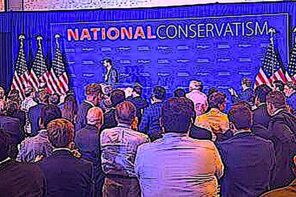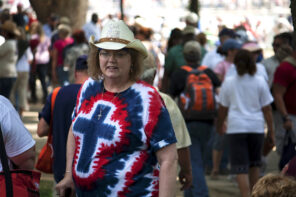I’m a black atheist who works in urban public schools of color that systematically funnel young people into juvenile jails and prisons. The school district I work in spends more on school police and paramilitary equipment than it does on school counselors and mental health. Meanwhile, under the privatization agenda of Education Secretary and right wing evangelical crusader Betsy DeVos, the U.S. public school system is in serious jeopardy. Is the school to prison pipeline an atheist issue? A secular issue? If you’re a white atheist with a kid in a segregated predominantly white K-12 suburban school, chances are it isn’t.
According to the Pew Research Center, the majority of atheists in the U.S. are white, male, Democrat-leaning and largely college-educated. Despite the rise of the so-called religious “nones,” a broad category that refers to religiously “unaffiliated” individuals, atheists as a whole represent a small, elite sliver of American society. When the mainstream media talk about or portray atheist politics it’s typically through a white Eurocentric lens that exalts white male atheist gurus like Richard Dawkins, Sam Harris and/or the late Christopher Hitchens as standard bearers.
Yet, progressive secular people of color, whether they identify as atheist, agnostic, freethinkers, humanist, skeptic or a combination of these, have always looked beyond the narrow confines of opposition to faith and religion for ethical purpose, meaning, and self-determination. It’s no revelation that the issues progressive non-believers of color care about are radically different than those of white atheists who view bashing religion and extolling church/state separation as the end-all be-all of secular advocacy.
Coming from communities under siege from racist, sexist, neoliberal policies that deepen socioeconomic inequities in jobs, housing, health care, and education, secularists of color can’t afford to fixate on church-state separation and say to hell with believers of color as privileged whites often do. As the wealth and income gap between African Americans and whites has increased, straining an already frayed social welfare safety net, people of color are seeking faith-based assistance in greater numbers.
In many respects, Trumpian right wing religious attacks on the Johnson amendment, public education, abortion rights, reproductive justice and LGBTQI rights have re-energized secular activism. Yet Black secularists in poor and working class African American communities are especially disdainful of liberal white atheists who bemoan the Religious Right’s grip on the Trump White House and public policy, yet remain silent on the racist criminalization of communities of color or rising homelessness among Black and Latinx folk.
Secular social justice is a way of defining and articulating these critical differences in focus and approach. Progressive secularists of color argue that you can’t fight for economic justice in communities of color without advocating for reproductive justice, unrestricted abortion rights, and access to universal health care. You can’t preach “gender equality” without redressing the heterosexist lack of representation of queer and trans people of color in K-12 curricula. You can’t advocate for LGBTQQ (lesbian, gay, bisexual, transgender, queer and questioning) enfranchisement without confronting all of the mechanisms that criminalize queer and trans youth of color and make them at greater risk for being incarcerated, placed in foster care and/or becoming homeless.
Secular social justice challenges humanist institutions to support the realities of our lived experiences in a “Christian nation” based on capitalist, racist, sexist, heterosexist class power. It pushes back on an atheism based on academic elites who tout “science and reason” while systematically profiting from racial segregation, white supremacy and straight white male privilege.
In April, the American Humanist Association is sponsoring the semi-annual Secular Social Justice (SSJ) conference in Washington, D.C. This first of its kind conference is designed to spotlight the intersectional, anti-racist organizing, activism and cultural work of secular people of color. When my comrade Donald Wright (founder of the National Day of Solidarity for Black Non-Believers) and I organized the first SSJ conference two years ago at Rice University in Houston, non-believers of color were struggling with the very same visibility and platform issues that they grapple with today. The majority often navigate between a white mainstream atheist world that has been hostile to intersectionality, black feminism and people of color, and socially conservative religious communities of color that view atheism as inauthentically black or tantamount to devil worship.
Sincere Kirabo, lead organizer for this year’s SSJ conference notes that SSJ “was developed as a direct response to pervasive complacency within the secular community that considers focus on matters of social justice issues unnecessary or a “distraction.” Countering that view, the conference will feature speakers and presenters from racial justice, law, public policy, queer, trans and immigrant rights activism, educational equity and humanist activism.
Finally, SSJ also speaks to a critical leadership vacuum in the mainstream atheist, humanist and secular movements. There are currently few to no people of color in executive management positions in major secular organizations (i.e., the Center for Inquiry, Secular Student Alliance, American Humanist Association, etc.). As a result, it is precisely because of anti-atheist religious bigotry, white atheist racism and the lack of culturally responsive secular organizations that the vast majority of non-believers of color do not feel comfortable openly identifying as atheist. And, until this shifts, the much-ballyhooed rise of the nones will only be a footnote for segregated communities of color.





